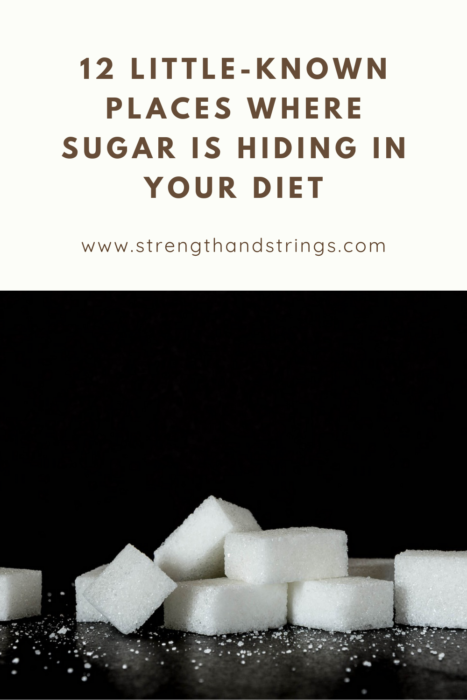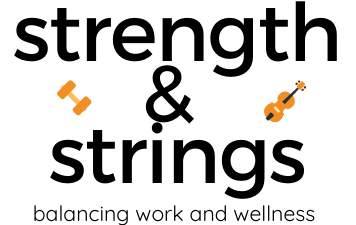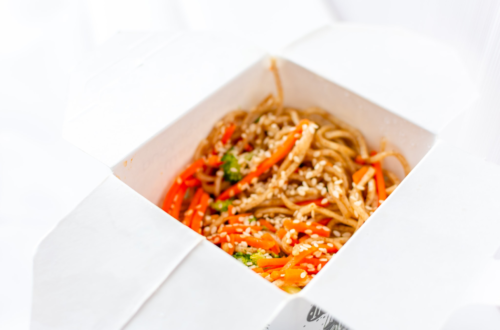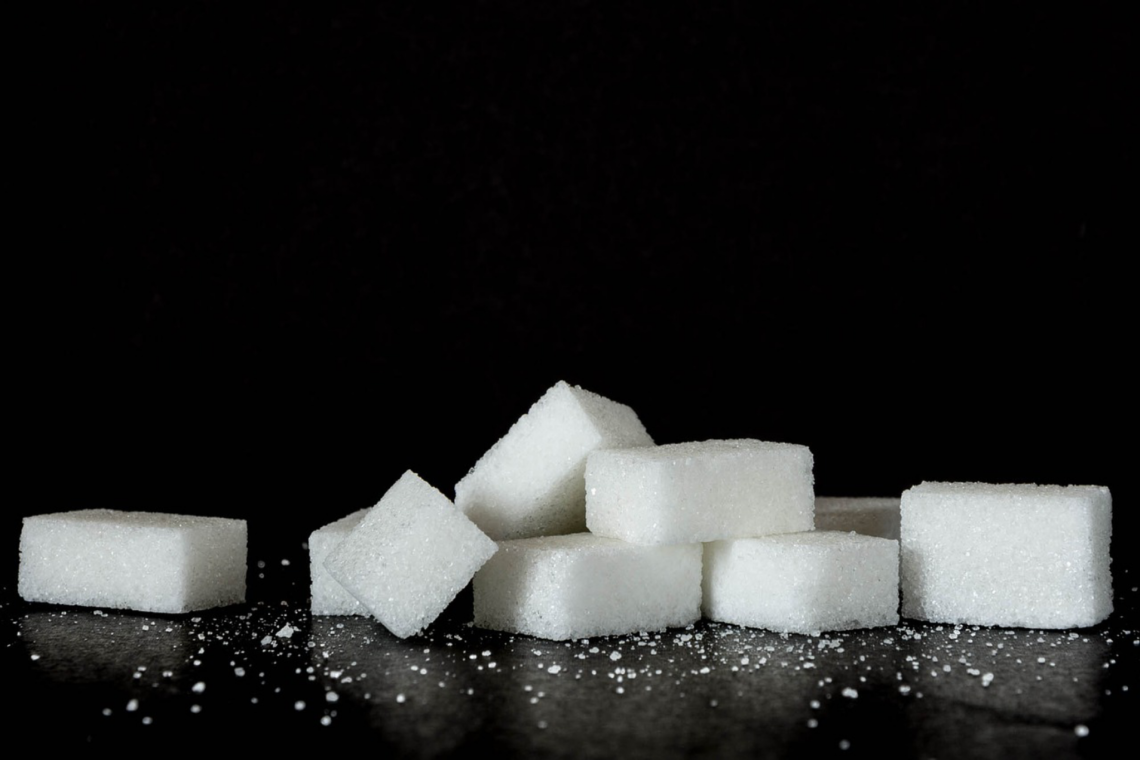
12 little-known places where sugar is hiding in your diet
You are eating more sugar than you think.
The Dietary Guidelines for Americans suggest that calories from added sugars should be less than 10% in the American diet. For someone that is eating 2,000 calories a day, that equates to 200 calories or 10 teaspoons.
While some sugar is unavoidable in foods like fruit (fructose) and milk (lactose), the average American is eating 32 teaspoons or 3 times the recommended amount in a single day!
Some of this excess sugar in the typical diet is by conscience choice by consuming sugary beverages like soda and eating candy and other snacks.
In other cases, we are eating foods and beverages that have added sugar without knowing it.
Table of Contents
Alternative names for sugar
Presently, there are 56 names for sugar used on food labels! The list below has a majority of commonly used names. Feel free to keep this list handy while grocery shopping or to declutter your pantry!
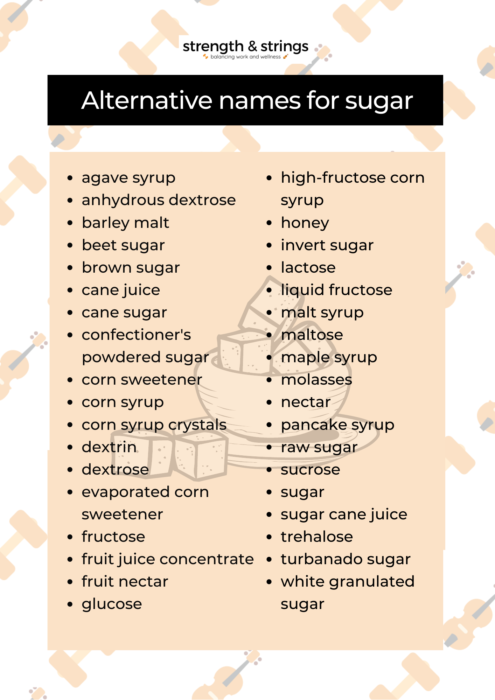
You may notice that some of these products are natural products. Just because it is natural does not mean it is not sugar!
Effects of excess sugar
Although excess sugar consumption can contribute to weight gain, the more pressing issue is the increased risk of developing diseases related to metabolic syndrome (high blood pressure, high blood sugar, excess body fat around the waist and abnormal cholesterol levels). Metabolic syndrome escalates the risk of developing heart disease, stroke and diabetes.
Additionally, sugar also has the following effects on the human body:
- impaired memory
- increased appetite due to affects on hormones
- increased amount of bacteria in mouth which can lead to cavities and gum disease
- reduced energy levels
- premature aging
Check out this infographic from the American Council of Exercise (ACE) for more information.
Foods surprisingly high in added sugar
According to this article, here are some foods that contain unexpected added sugars.
- Salad dressing
- Flavored yogurt
- Spaghetti sauce
- Ketchup
- Barbecue sauce
- Pre-made soups
- Protein bars
- Breakfast cereal (including granola)
- Sports drinks
- Flavored coffee
- Pre-made smoothies
- Canned baked beans
As you can see, some “healthy” foods can have as much sugar as a candy bar!
How can I reduce the amount of added sugars in my diet?
Here are a few simple ways you can reduce added sugars in your diet:
Prepare your own food.
When making your own dishes or sauces, you have more control over the amount of sweetener used. I personally like making my own salad dressing. Also, consider using alternatives such as applesauce in baked goods.
Learn how to identify added sugars on food labels and look for products with less.
While shopping for products, take a look at the amount of added sugar (listed underneath the Total Carbohydrate) on the label as well as the placement of sugar on the ingredient list. If sugar is toward the front of the ingredient list, that indicates that sugar is prominent in the food.
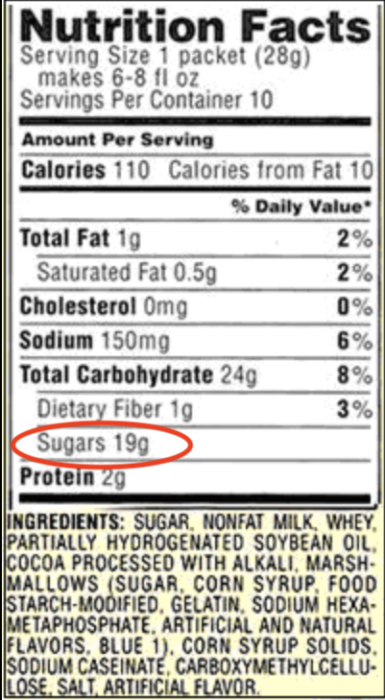
Use the unsweetened version of your favorite foods and add your own sweetener to taste.
Similar to making your own, I prefer to buy the unsweetened version of products and add the sweetener of my choice. For example, I purchase plain non-fat greek yogurt and add fruit and nut butter to taste. I do the same thing with oatmeal by avoiding the pre-flavored packets and create my own bowl with the original version.
Reduce your portion size.
Sometimes, we just need to have ketchup with our fries. While using sauces, be mindful of the amount that you are using on your foods. Also, consider dipping your foods instead of placing them directly on the food.
Plan your sugar splurges.
Having dessert after dinner is okay, as long as it is not a daily habit. For those occasions, try to limit sugar intake during the day.
Want more tips for healthier eating? Check out the post 5 small ways I made to became a healthier eater!
Are reduced sugar or sugar-free alternatives healthier?
Short answer: Yes and no.
Some pros of these sweeteners is reduced calorie count and added sugars in your diet and less impact on your blood sugar. This may help with short-term weight loss.
Some cons are negative side effects on the digestive system, an increased appetite and altered taste. You may react differently to different types.
Depending on the product, it may be better to have a smaller portion of the regular food or beverage.
Final considerations
In small amounts, sugar is fine to consume, especially from nutrient dense sources such as whole fruit. Due to the prevalence of added sugar in our foods, we must be aware of the amount of added sugar in our food and proactive about limiting the amount in our diet.
Do you currently eat a lot of sugar? How do you reduce the amount of added sugars in your diet?
